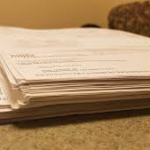Volumes Category
A Proposal to End Discovery Abuse
Nov. 30, 2018—A-Proposal-to-End-Discovery-Abuse AUTHOR: Alexandra D. Lahav
A Plan for Reforming Federal Pleading, Discovery, and Pretrial Merits Review
Nov. 30, 2018—A-Plan-for-Reforming-Federal-Pleading-Discovery-and-Pretrial-Merits-Review AUTHORS: David Rosenberg Anne Brown Jaehyun Oh Benjamin Taylor
One-Way Fee Shifting After Summary Judgment
Nov. 30, 2018—One-Way-Fee-Shifting-After-Summary-Judgment AUTHOR: Cameron T. Norris
A Comparative Discussion of Who Pays for Document Discovery in Australia, Canada, Guernsey (Channel Islands), and Singapore and its Effect on Access to Justice
Nov. 30, 2018—A-Comparative-Discussion-of-Who-Pays-for-Document-Discovery-in-Australia-Canada-Guernsey-Channel-Islands-and-Singapore-and-its-Effect-on-Access-to-Justice AUTHORS: Gordon McKee Anne Glover Francis Rouleau
Discovery and the Social Benefits of Private Litigation
Nov. 30, 2018—Discovery-and-the-Social-Benefits-of-Private-Litigation AUTHOR: Paul Stancil
Access to Justice, Rationality, and Personal Jurisdiction
Oct. 19, 2018—Access-to-Justice-Rationality-and-Personal-Jurisdiction ABSTRACT: After more than twenty years of silence, the Supreme Court has addressed personal jurisdiction six times over the last six Terms. This Article examines the Court’s recent decisions in terms of their effect on access to justice and the enforcement of substantive law. The Court’s new case law has unquestionably made it harder...
Administrative Law’s Political Dynamics
Oct. 19, 2018—Administrative-Laws-Political-Dynamics ABSTRACT: Over thirty years ago, the Supreme Court in Chevron, U.S.A., Inc. v. Natural Resources Defense Council, Inc. commanded courts to uphold federal agency interpretations of ambiguous statutes as long as those interpretations are reasonable. This Chevron deference doctrine was based in part on the Court’s desire to temper administrative law’s political dynamics by...
Hindsight Bias in Antitrust Law
Oct. 19, 2018—Hindsight-Bias-in-Antitrust-Law AUTHOR: Christopher R. Leslie
The Jim Crow Jury
Oct. 19, 2018—The-Jim-Crow-Jury ABSTRACT: Since the end of Reconstruction, the criminal jury box has both reflected and reproduced racial hierarchies in the United States. In the Plessy era, racial exclusion from juries was central to the reassertion of white supremacy. But it also generated pushback: a movement resisting “the Jim Crow jury” actively fought, both inside and...
The Trouble with Corporate Conscience
Oct. 19, 2018—The-Trouble-with-Corporate-Conscience ABSTRACT: Accomplished corporate law scholars claim that modern businesses need an infusion of morality. Disappointed by conventional regulatory responses to recurring corporate scandal, these scholars argue that corporate conscience provides a more fruitful path to systemic economic reform. In Burwell v. Hobby Lobby, which held that for-profit businesses can claim religious exemptions from general...
Common Sense: Rethinking the New Common Rule’s Weak Protections for Human Subjects
Oct. 19, 2018—Common-Sense-Rethinking-the-New-Common-Rule27s-Weak-Protections-for-Human-Subjects ABSTRACT: Since 1991, the Federal Policy for the Protection of Human Subjects, known as the “Common Rule,” has protected the identifiable private information of human subjects who participate in federally funded research initiatives. Although the research landscape has drastically changed since 1991, the Common Rule has remained mostly unchanged since its promulgation. In an...
Trafficked in Texas: Combatting the Sex-Trafficking Epidemic Through Prostitution Law and Sentencing Reform in the Lone Star State
Oct. 19, 2018—Trafficked-in-Texas-Combatting-the-Sex-Trafficking-Epidemic-Through-Prostitution-Law-and-Sentencing-Reform-in-the-Lone-Star-State ABSTRACT: American law has historically treated prostitution as a victimless crime, a moral trespass between two consenting individuals, rather than a potential act of violence, a product of fraud or coercion. However, growing awareness of the international sex-trafficking epidemic has brought long-settled prostitution law once more under the critical eye of academics and lawmakers...
Bankrupted Slaves
May. 22, 2018—Bankrupted-Slaves ABSTRACT Responsible societies reckon with the pernicious and ugly chapters in their histories. Wherever we look, there exist ever-present reminders of how we failed as a society in permitting the enslavement of millions of black men, women, and children during the first century of this nation’s history. No corner of society remains unstained. As...
Regulating Fintech
May. 22, 2018—Regulating-Fintech ABSTRACT The financial crisis of 2008 has led to dramatic changes in the way that finance is regulated: the Dodd-Frank Act imposed broad and systemic regulation on the industry on a level not seen since the New Deal. But the financial regulatory reforms enacted since the crisis have been premised on an outdated idea...
Plaintiff Cities
May. 22, 2018—Plaintiff-Cities ABSTRACT When cities are involved in litigation, it is most often as defendants. However, in the last few decades, cities have emerged as aggressive plaintiffs, bringing forward hundreds of mass-tort style claims. From suing gun manufacturers for the scourge of gun violence, to bringing actions against banks for the consequences of the subprime mortgage...
The Political Economy of Corporate Exit
May. 22, 2018—The-Political-Economy-of-Corporate-Exit ABSTRACT Corporate political activity is understood to include financial contributions, lobbying efforts, participation in trade groups, and political advertising, all of which give corporations a “voice” in public decisionmaking. This Essay contends that the accepted definition of corporate political activity overlooks the importance of “exit.” Corporations do not need to spend money to exert...






